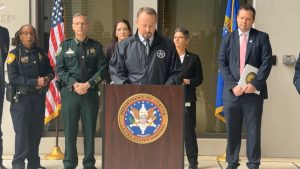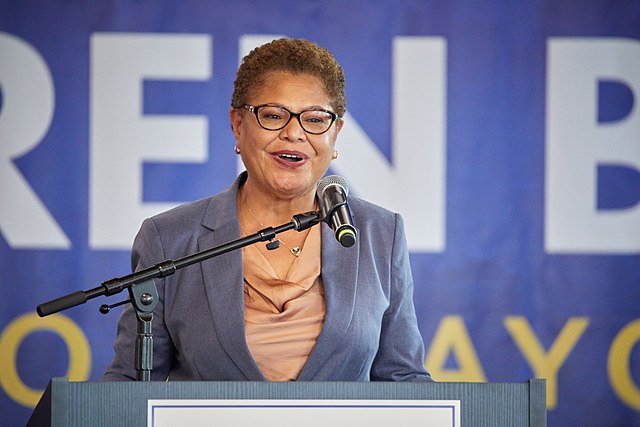Los Angeles Mayor Karen Bass recently made a statement that has ignited widespread discussion and drawn attention from both local and national audiences. During a press conference addressing the city’s crime rates and responding to critiques from federal officials, Mayor Bass declared, “There is nothing — anything — in this city that has happened that comes even close to a crime, period. Let alone a crime against humanity.”
The remark, delivered with apparent confidence, has prompted a variety of reactions from political observers, residents, and media outlets. Supporters of Mayor Bass argue that her statement reflects a deliberate effort to highlight the city’s accomplishments in maintaining public safety and fostering community well-being. Advocates suggest that emphasizing the city’s positive attributes can bolster civic pride and encourage residents to actively participate in initiatives aimed at further improving quality of life.
“Mayor Bass is focusing on solutions and optimism,” said one local community organizer. “By framing the conversation around what’s working in Los Angeles, she encourages residents to engage rather than fear the worst.” This perspective suggests that the mayor’s intention was not to dismiss the existence of crime entirely but to underscore the city’s commitment to safety and proactive governance.
However, critics have been quick to challenge the mayor’s assertion, citing data and reports that paint a more nuanced picture of crime in Los Angeles. Statistics from recent years indicate that while some crime categories have declined, others, including property crimes and certain forms of violent offenses, have seen upticks in specific neighborhoods. These figures have led some analysts and community members to question the accuracy of Bass’s statement and call for a more measured discussion of public safety challenges.
“Los Angeles is a large and diverse city,” noted a local criminologist. “While there are areas that are relatively safe, there are also neighborhoods where crime remains a serious concern. Statements like this risk oversimplifying a complex reality.” Critics argue that by presenting an overly optimistic narrative, the city risks alienating residents who experience crime firsthand and undermining the credibility of local leadership.
The timing of Mayor Bass’s comments has also fueled speculation about political motives. With national attention focused on immigration policies and federal law enforcement actions, some observers interpret the statement as an attempt to assert local authority and counteract external pressures. In this context, the remark can be seen as both a symbolic defense of Los Angeles’ governance approach and a message to federal agencies about the city’s autonomy in addressing its challenges.
In response to the ensuing debate, Mayor Bass has reiterated her commitment to public safety and community-oriented policing strategies. She emphasized ongoing efforts to collaborate with law enforcement agencies, implement preventive measures, and engage residents in safety initiatives. Her office stated that these efforts are designed to balance acknowledging the city’s challenges with celebrating its successes, reflecting a holistic approach to urban governance.
“Public safety is a priority, but it requires cooperation and understanding from all parts of the community,” Bass said in a recent statement. “Our approach is not to ignore challenges, but to address them proactively while fostering a sense of trust and partnership with residents.”
https://twitter.com/Bubblebathgirl/status/1957951848360603927
The controversy surrounding the mayor’s remarks underscores the complexities faced by city leaders in navigating the intersection of public perception, statistical realities, and political pressures. It also highlights the critical role of transparent communication and accurate information in shaping discourse about urban safety. By stimulating conversation on these issues, the statement has opened the door to broader discussions about governance, resource allocation, and community engagement in Los Angeles.
As the debate continues, residents and policymakers alike are encouraged to engage in constructive dialogue that acknowledges both the successes and shortcomings of the city’s approach to crime. Moving forward, fostering collaboration between municipal authorities, law enforcement, and the community will be essential in developing solutions that enhance safety and quality of life across all neighborhoods.
In conclusion, Mayor Bass’s statement has clearly struck a chord, generating both support and criticism. Beyond the immediate controversy, it has sparked a wider conversation about crime, governance, and civic responsibility in Los Angeles. The challenge for city leaders will be to translate this dialogue into practical action, ensuring that public discourse leads to tangible improvements in the lives of residents while maintaining the delicate balance between optimism and realism in addressing urban challenges.

James Jenkins is a celebrated Pulitzer Prize-winning author whose work has reshaped the way readers think about social justice and human rights in America. Raised in Atlanta, Georgia, James grew up in a community that instilled in him both resilience and a strong sense of responsibility toward others. After studying political science and creative writing at Howard University, he worked as a journalist covering civil rights issues before dedicating himself fully to fiction. His novels are known for their sharp, empathetic portraits of marginalized communities and for weaving personal stories with broader political realities. Jenkins’s breakout novel, Shadows of Freedom, won national acclaim for its unflinching look at systemic inequality, while his more recent works explore themes of identity, resilience, and the fight for dignity in the face of oppression. Beyond his novels, James is an active public speaker, lecturing at universities and participating in nonprofit initiatives that support literacy and community empowerment. He believes that storytelling is a way to preserve history and inspire change. When not writing, James enjoys jazz music, mentoring young writers, and traveling with his family to explore cultures and stories around the world.









